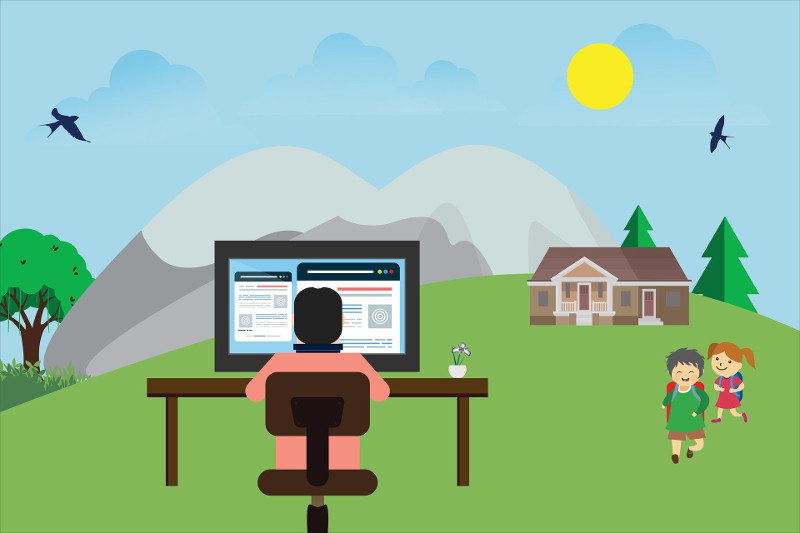Les sympathisants de la FSFE publient "Pourquoi utiliser des Logiciels Libres pour le travail à distance et lesquels"?
vendredi 3 avril 2020 à 01:00En raison de l'épidémie actuelle du virus Covid-19, de nombreux employeurs - volontaires ou obligatoires - travaillent désormais à distance. De nombreuses organisations qui n'étaient pas habituées au travail à distance jusqu'à présent sont maintenant confrontées à un certain nombre de difficultés pour s'adapter à la situation. Pour éviter d'éventuels blocages, certains partisans de la FSFE ont collectivement écrit sur les bonnes raisons d'utiliser des Logiciels Libres pour le travail à distance et ont rassemblé une liste détaillée de solutions pratiques dans notre wiki.
En raison de l'épidémie actuelle du virus Covid-19, de nombreuses organisations qui n'avaient jamais auparavant orienté leur réflexion stratégique vers les solutions disponibles pour le travail à distance dans leur entreprise optent désormais pour une solution rapide et choisissent de suivre les offres - au début souvent gratuites - des grandes entreprises technologiques et leurs solutions propriétaires. Cependant, de telles solutions propriétaires enfermeront ces organisations à l'avenir.
Au lieu de quoi choisir une solution de Logiciel Libre signifie opter pour une solution qui a un avenir, où votre organisation ne dépend plus d'un fournisseur ou d'un format de fichier particulier ou de tout autre moyen que ces fournisseurs choisissent de vous enfermer. Le Logiciel Libre vous donne le contrôle.
Pour vous aider à démarrer ou à approfondir l'utilisation des Logiciels Libres pour le travail collaboratif et à distance, certains partisans de la FSFE ont travaillé sur une liste détaillée de Logiciels Libres pour différents objectifs et ont publié le résultat dans notre wiki. Trouvez l'inspiration pour votre environnement de travail ou ajoutez votre propre solution.
 Profitez de la liberté des logiciels tout en travaillant à distance.
Nous sommes une communauté diversifiée de personnes de toute l'Europe et au-delà, qui s'engagent pour le Logiciel Libre. Si vous êtes comme nous, rejoignez-nous dans notre travail pour la liberté. Il y a de nombreuses façons de s'engager et vous trouverez sûrement un moyen qui correspond à vos intérêts et compétences. Ces temps sont également difficiles pour les organisations caritatives comme la FSFE. Nous nous efforçons de donner aux utilisateurs les moyens de contrôler la technologie. Nous nous battons pour les droits des utilisateurs depuis 2001 et nous restons indépendants grâce à l'aide de nos donateurs et sympathisants. Pour rester une voix indépendante pour le Logiciel Libre, nous dépendons de vos dons. Avec votre support financier, vous contribuez à renforcer les bases sur lesquelles nous pouvons bâtir notre action caritative en faveur de la liberté dans la société de l'information.
Profitez de la liberté des logiciels tout en travaillant à distance.
Nous sommes une communauté diversifiée de personnes de toute l'Europe et au-delà, qui s'engagent pour le Logiciel Libre. Si vous êtes comme nous, rejoignez-nous dans notre travail pour la liberté. Il y a de nombreuses façons de s'engager et vous trouverez sûrement un moyen qui correspond à vos intérêts et compétences. Ces temps sont également difficiles pour les organisations caritatives comme la FSFE. Nous nous efforçons de donner aux utilisateurs les moyens de contrôler la technologie. Nous nous battons pour les droits des utilisateurs depuis 2001 et nous restons indépendants grâce à l'aide de nos donateurs et sympathisants. Pour rester une voix indépendante pour le Logiciel Libre, nous dépendons de vos dons. Avec votre support financier, vous contribuez à renforcer les bases sur lesquelles nous pouvons bâtir notre action caritative en faveur de la liberté dans la société de l'information.